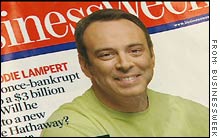NEW YORK (CNN/Money) -
With its deal to buy Sears Roebuck & Co., Kmart is not only capping one of the greatest corporate comebacks in history, it is helping to make a legend of Edward Lampert its young, hard-charging chairman.
 |
|
| Eddie Lampert, Kmart Chairman |
Kmart Corp., struggling to emerge from bankruptcy less than two years ago, is using the strong gains in its stock over the last 18 months to buy its larger and more established rival.
The deal brings together not only two retailers that have struggled in their competition with Wal-Mart, Home Depot and Target, it combines two of the biggest holdings of Lampert, who has shown an eagerness to invest in underperforming companies.
Lampert, 42, is a Connecticut-based money manager who grabbed about 53 percent of Kmart during its bankruptcy proceedings, and owns about 15 percent of Sears. He adorns the cover of this week's Business Week, which poses the question, "The Next Warren Buffett?"
Observers say Lampert was interested in using Kmart as a cash cow to help him make additional investments, the way Buffett once used a troubled textile maker in New Bedford, Mass., as the basis for his now diversified investment company, Berkshire Hathaway.
In an unusual filing with the Securities and Exchange Commission in August, Kmart said its board had given Lampert authority to invest its excess cash in acquisitions as he saw fit, subject to normal restrictions and credit line limitations. The company had $2.6 billion in cash as of July 28, up from $1.2 billion just before it emerged from bankruptcy in April 2003.
After Kmart came out of bankruptcy the following month, its stock started to rocket from its $15 price, and is now up nearly eight-fold since its debut. Much of that was seen as tied to the estimated value of its real estate. In fact it sold 76 stores or store leases to Sears and Home Depot last summer for nearly $1 billion.
Meanwhile, Sears stock lost more than a quarter of its value over the 12 months through Nov. 4. But the next day the shares jumped 23 percent on news that real estate investment firm Vornado Realty Trust had bought about a 4.3 percent stake in Sears.
"This certainly came as a total surprise, but maybe it shouldn't have," said retail analyst Kurt Barnard. "I think we're looking at a real estate deal here."
Wednesday's deal was advertised as a merger of equals, and the new parent company will have Sears in its name and be based at Sears' suburban Chicago headquarters. But the way it is structured show how it's actually a Kmart purchase.
Sears shareholders will be able to choose between $50 in cash or half of a share of Sears Holdings, the new parent company, which the companies said would be valued at $50.61.
Kmart shareholders would get one share of Sears Holding for each of their shares, which closed Tuesday at $101.22.
That means the deal provides about a 10.6 percent to 12 percent premium for Sears shareholders, while Kmart shareholders will see either no premium or a slight decline, if the shares are valued based on the cash offer to Sears shareholders.
Still, investors welcomed the deal, sending shares of both Kmart (up $14.33 to $115.55, Research) and Sears (up $9.55 to $54.75, Research) soaring in afternoon trading.
While the company says it intends to keep both brands, many analysts expect only one name to survive long term. The Sears name in the holding company, and the fact that hundreds of stores will be converted to Sears from Kmart, makes some believe that it is the Kmart name that is doomed.
"I would be very surprised if Kmart doesn't completely go away in the two to three years, or become something completely different," industry consultant George Whalin said.
But Barnard suggested that the Sears name could be the loser.
"Don't be so sure that Sears is the one that survives. Kmart is a discount store name and perhaps more able to compete with Wal-Mart on that basis than Sears," he said.
There have been several corporate mergers in the past where the buyer kept the acquired company's brand and lost its own name, including First Union's purchase of Wachovia in 2001.
Not surprisingly, Lampert will be chairman of the combined company, holding at least a third of its stock, and perhaps more depending on many Sears shareholders take cash rather than stock.
Sears Chairman and CEO Alan Lacy will serve as CEO of the holding company while Kmart CEO Aylwin Lewis will be president of the holding company and CEO of the Sears and Kmart retail units.
For more on what the deal means for consumers, click here.

|

